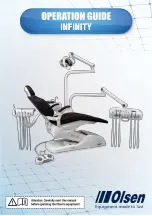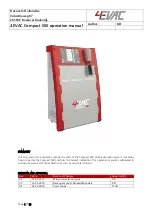
• t
I.L. 29-8858
5.2 When To Test
Tests can be conducted with the breaker in the "con
nected" cell position while carrying load current. How
ever, as stated in the caution note in Section 5. 1 , good
practice will limit circuit breaker in-service "trip tests",
where required, to maintenance periods during times of
minimum load conditions. Testing, prior to start-up can
best be accomplished with the breaker out of its cell or in
the "Test", "Disconnected" or "Withdrawn" (or Removed)
cell positions.
Note: Since time-current settings are based on
desired system coordination and protection
schemes, the protection settings selected and preset
in accordance with Section 4.0 above should not be
altered during or as a part of any routine test
sequence.
5.3 Test Provision
As indicated in Fig. 5, six different ''Test Amps" settings
(1 , 2, 3, 6T, 8 and 1 OX In) are available for testing the
phase elements of the trip unit, and two (GF, GFT) are
provided for testing the g round elements.
A
CAUTION
A SETTING OF EITHER
6T OR G FT WILL TRIP THE
CIRCUIT BREAKER.
(SEE SECTION 5.4.3 B ELOW.)
For any combination of the phase protection settings, an
appropriate "No Trip" condition can be set to test the long
time, short time and instantaneous trip settings without
tripping the circuit breaker.
I n the "GF" test position, the level of test current based on
In, is adequate to demonstrate the operating condition of
the trip unit without tripping the circuit breaker. This is a
functional check only, not a calibration.
5.4 Conducting Tests
1 )
Before starting any test sequence,
check the
Unit Status (Green LED) in the lower right corner of
the trip unit (See Figs. 1 and 5) to be sure it is blink
ing on and off about once each second, which indi
cates that the trip unit is functioning normally.
In the
event the U nit Status LED is not blinking, install an
Auxiliary Power Module (APM) (See Fig. 7), or if
you have one already, check to see that it is con
nected correctly.
2)
If the circuit breaker is carrying current,
check
for the following conditions:
Effective May 1 997
Page 1 1
a)
the current is not less than
1 0% of the
breaker frame (or current sensor) rating; be
sure the "GREEN" Unit Status LED (in the
lower right corner of the trip unit (See Figs.
1 and 5) is blinking on and off (indicating
that there is enough current flowing to pro
vide the power necessary to operate the
trip unit).
In the event the Unit Status
LED is either lighted "GREEN" or "OFF"
continuously, there is NOT enough cur
rent flowing to power the trip unit; and
an APM (See Fig. 7) should be installed
before proceeding with the test.
and b) the current is not more than 50% of the
Long Delay Current Setting (1,); because
the trip unit will not execute your test
instructions when it senses that the
current through the breaker exceeds
the 50% level.
3)
When performing tests on the Long Delay ele
ment,
be aware that in addition to the standard pro
tection element, the Digitrip RMS 510 Trip Unit also
has a Long Time Memory function (LTM),
which
serves to protect load circuits from the effects
cf
repeated overload conditions. (See NOTE 1 under
Section 4.3 Long Delay Time Setting.) The action
of the LTM will have the same effect of advancing
the Long Delay Trip Time if multiple Long Delay
Time tests are performed repeatedly - as one might
do in making single phase tests on each pole of a
breaker in succession, for example. If you have suf
ficient experience in performing tests with this kind
of accelerated trip timing, you may be comfortable
with the results of tests performed in quick succes
sion. However, if there is any question, you may
simply wait about ten (1 O) minutes after a Long
Delay Trip for the LTM to reset, before you check
the next pole.
5.4.1 Control Power
For testing the trip unit, an optional Auxiliary Power Mod
ule (Cat. No. P RTAAPM) as shown in Fig. 7 is recom
mended. This Auxiliary Power Module, which operates
from a separate 1 20 Vac supply, may be used when a
drawout circuit breaker is in any of its four cell positions,
i.e., "Connected", "Test", "Disconnected" and 'Withdrawn"
(or "Removed.")
Note: For Testing Purposes Only: When using an
external single phase current source to test low level
ground fault current settings, it is advisable to use
the Auxiliary Power Module (APM) (See Fig. 7). Espe
cially when the single phase current is low, without
www
. ElectricalPartManuals
. com
















































